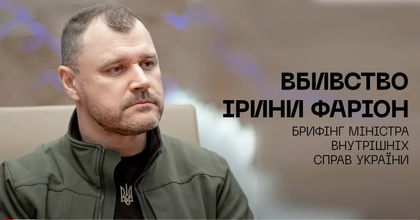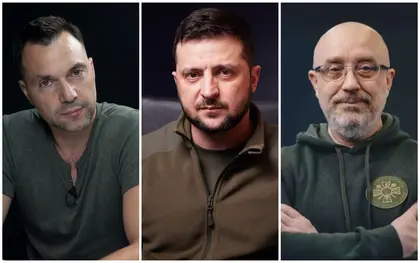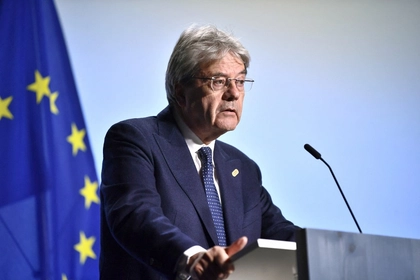A new survey has shown just how much the political standings of some of Ukraine’s current leaders have soared since the launch of Russia’s full-scale invasion, while an older generation of politicians continue to sink further both in popularity and relevance.
The Ukrainian Sociological Service of the Razumkov Center recently published the results of a new survey conducted in May, in which the Ukrainian public was asked which political and public figures they trusted, and which they didn’t.
JOIN US ON TELEGRAM
Follow our coverage of the war on the @Kyivpost_official.
Perhaps unsurprisingly, President Volodymyr Zelensky was considered the most trustworthy, with a rating of 83%, a number that has surged on the back of his leadership since the full-scale invasion of Ukraine.
Prior to the war, a survey held in 2021 shortly after he became President showed that 60% of Ukrainians did not trust him.
"The increase in support is due to the fact that his activity as the supreme commander, his activity in organizing the country's life during the war is highly valued by Ukrainians," Mykhailo Mishchenko, a sociologist at the Razumkov Center, told Kyiv Post.
The second highest rating went to Vitaly Kim, head of the Mykolaiv Regional Military Administration, with 63% of Ukrainians trusting him.
 Vitaly Kim. Photo: Kim's Telegram channel
Vitaly Kim. Photo: Kim's Telegram channel
Razumkov said that his rating owed much to the quantity and quality of his use of social media. Faced with the very real threat that Mykolaiv could be occupied by the Russians, Kim constantly communicated the situation to Ukrainians through social media networks, especially on Telegram.

Farion’s Killer Prepared Disguises, Had Another Victim in His Sights, Interior Minister Says
He became something of a national star, with Ukrainian and foreign media predicting his future presidency.
It hasn’t all been plain-sailing though – following a Kalibr missile attack on his regional administration building in March 2022, he recorded a video from his office where he complained that the strike had destroyed his stock of e-cigarettes.
 Mykolayiv regional administration after shelling.Photo: NIKVESTI
Mykolayiv regional administration after shelling.Photo: NIKVESTI
When it became apparent that several people had died in the Russian attack, Kim quickly deleted the video and apologized for the joke. Since then, he has limited his media activity.
Ukrainians gave third and fourth place to the well-known volunteer Serhiy Prytula, 56%, and Mykhailo Podolyak, adviser to the head of the President's Office, 51%.
Prytula is known for his foundation which has worked tirelessly to collect record amounts of donations for the purchase of Bayraktar drones and satellite systems in support of Ukrainian troops.
 Serhiy Prytula. Photo: Facebook
Serhiy Prytula. Photo: Facebook
He is predicted to have a successful future in politics, but Prytula is reluctant to talk about any ambitions he might have in that direction.
Podolyak has a high profile among Ukrainians because of his frequent comments on television and in social networks, the sociologist Mishchenko noted.
His political opponents, however, are not so forgiving and constantly remind people about Podolyak's past indiscretions, particularly an interview with the fugitive former president, Viktor Yanukovych in the illegally built residence of Mezhyhirya near Kyiv, in 2011.

Mykhailo Podolyak (left) and Viktor Yanukovych (center). Photo: obozrevatel.com
So far people seem willing to forgive these past actions and his trust rating remains high.
The situation is also positive for his boss, Andriy Yermak, the head of the President's Office who has the trust of 37% of Ukrainians despite a role that traditionally fosters distrust among the public.
However 40% of respondents do not trust him because of a series of allegations involving political and corruption scandals.
For example, many still believe that Yermak’s actions blocked the arrest of around 30 Wagner mercenaries by the Ukrainian special services in August 2020, although he denies it. The mercenaries were suspected of being engaged in military operations against the Ukrainian army in the occupied Donbas.
"In general, it can be said that this is a good result because, in the Ukrainian political tradition, the head of the President's Office has never enjoyed a particularly high level of trust,” Mishchenko says.
“They are perceived as eminence grise. Therefore, when the rating of trust and distrust is approximately the same, it is still a good indicator. In July-August 2021, only 10% of Ukrainians trusted him.”
Also among the leaders with notable levels of support are the Secretary of the National Security and Defense Council Oleksiy Danilov, at 46%, and Kyiv Mayor Vitaliy Klitschko, at 48.4%.
Mishchenko noted that before the full-scale invasion of Ukraine, support for the mayor had fallen to 26% in 2021.
Now the situation has changed. But after another public fall out with Zelensky, the sociologist predicts this may change.
The rating of confidence towards members the Cabinet of Ministers was headed by Defense Minister Oleksiy Reznikov, at 43% of Ukrainians trusting him, even after corruption scandals involving the procurement of food for the military.
Prime Minister Denys Shmyhal cannot boast of such figures, with more people not trusting him, at 39% as those that do, at 36%. The sociologist explains that is the recent rise in the price of electricity has played a negative role.
 Denys Shmyhal. Photo: the Cabinet of Ministers
Denys Shmyhal. Photo: the Cabinet of Ministers
The results of the social survey demonstrate overall low public support for the Verkhovna Rada. More Ukrainians no longer trust their lawmakers. Even the leader of the "Servant of the People" presidential party, David Arahamiya, has only 18% support compared with 45% that distrust him.
A number of leaders have negative rating scores including were deputies Yury Boyko (pro-Russian party "Opposition Platform - For Life"), at -77%, Petro Poroshenko (European Solidarity party), at -70% and Yulia Tymoshenko (Batkivshchyna party), at -80%.
"Ukrainians have already developed a negative attitude towards politicians of the older generation,” Mishchenko says. “Actually, it was primarily because of this that Zelensky won in 2019.
“Due to the tiredness of old politicians, Ukrainians were looking for an alternative to the younger generation of politicians. And obviously, these politicians of the older generation have [already] had quite a few chances to regain the level of trust.”
One person who’s standing in Ukrainian society has fallen dramatically is blogger Oleksiy Arestovych. Not so long ago, he worked in the President's Office but was fired due to criticism over his constant flirting with the Russian opposition.
Ukrainians also could not forgive Arestovych's false reassurance that the war would end in 2-3 weeks. As a result, 65% of respondents no longer trust him, although 20% still remain as his supporters.
You can also highlight the text and press Ctrl + Enter






